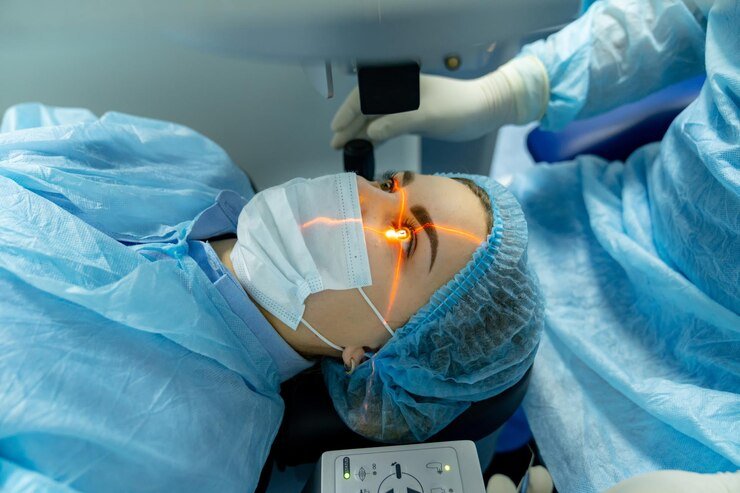Overview
Can nasal blockage persist after septoplasty?
Yes, it's possible even months later. Let's know the reason behind it.
Septoplasty is a surgical procedure to correct a deviated septum—the wall between the nostrils. This surgery improves airflow in the nose and eases breathing problems. Most patients expect clear breathing post-surgery, but some experience persistent nasal blockage.
While septoplasty generally resolves airflow issues, 10-15% of patients may experience symptoms like nasal congestion or blockage months after the procedure. The persistence of these symptoms can be due to several factors, including incomplete correction of the deviation, post-surgical swelling, or scar tissue formation.
Understanding why some people feel blocked even after surgery is crucial for addressing and managing the condition.
If you're facing ongoing nasal blockage after septoplasty, consulting with an ENT specialist is essential to explore further treatment options.
Understanding Septoplasty
What exactly is septoplasty?
Septoplasty is a surgical procedure designed to correct a deviated septum—the structure inside your nose that divides your nostrils. The septum should be straight to allow equal airflow in both nostrils. If it’s crooked, it can block part of your nose and make it hard to breathe.
Here are the key reasons why someone might undergo septoplasty:
- Improved Breathing: The primary goal is to straighten the septum to enhance airflow and ease breathing.
- Reduced Nasal Congestion: Fixing the septum can help relieve chronic congestion and make it easier to breathe through the nose.
- Better Sleep: A deviated septum can contribute to snoring and sleep apnea. Septoplasty can help lessen these sleep disturbances.
Are you struggling with breathing issues or snoring at night? Connect with the best ENT specialists in India and get relief through personalized treatment.
What are the reasons your nose is still blocked?
It can be frustrating to experience nasal blockage months after a septoplasty, especially when you expect a clear and free breathing path.
Common Causes of Persistent Nasal Blockage After Surgery:
- Incomplete Correction: Sometimes, the septum may not be straightened during the initial surgery, or it might shift during healing.
- Scar Tissue: Scar tissue can form as the nose heals, leading to new blockages.
- Swelling: Post-operative swelling is normal, but prolonged swelling can keep your nasal passages narrow and blocked.
Healing Processes and Timelines:
- Immediate Recovery: The first few weeks after surgery are critical, with noticeable swelling and sensitivity.
- Long-term Healing: Complete healing and settling of tissues can take several months. During this time, gradual improvements in airflow should be noticeable.
Wondering why you're still feeling blocked after septoplasty? Let's explore some key factors.
Factors Contributing to Post-Septoplasty Blockage
After septoplasty, several issues can contribute to continued nasal blockage:
- Anatomical Considerations:
- Residual Deviations: Sometimes, the septum isn't completely straightened during surgery or may shift as it heals.
- New Deviations: New obstructions can develop due to how tissues heal or settle after surgery.
- Scar Tissue Formation: As the nasal tissues heal, scar tissue can form, which might narrow the passages or block airflow.
- Swelling and Healing Phases:
- Immediate Swelling: Right after surgery, swelling is common and can block nasal passages.
- Long-Term Healing: Swelling can persist for months, decreasing as the nose heals.
Persistent issues? It might be worth discussing further treatment options with your doctor. - call us to book your appointment today
Preventing Complications after Septoplasty
Proper post-operative care is crucial for a smooth recovery:
- Tips on Post-Operative Care:
- Follow your doctor’s instructions, including how to clean your nasal passages and any medications to use.
- Keep your head elevated to reduce swelling and promote drainage.
- Signs to Watch For and When to Contact a Healthcare Provider:
- Excessive bleeding, severe pain, or increased swelling are signs that something might be wrong.
- Signs of infection, such as fever or foul-smelling discharge.
Experiencing persistent nasal blockage after septoplasty can be frustrating. Adhering to post-operative care instructions meticulously is crucial to prevent this issue. This includes regular saline rinses to keep the nasal passages clean and moist, avoiding activities that could irritate the nose, and attending follow-up appointments with your surgeon. Additionally, maintaining overall health by staying hydrated and refraining from smoking can aid healing," says Dr. Babita Goel, a general physician with more than 25 years of experience in Mumbai.
Diagnosing Persistent Blockage
Still experiencing blockage after septoplasty? Here’s what to expect during a follow-up.
- Physical Examination: The doctor will inspect the inside of your nose, checking for physical blockages, swelling, or abnormal tissue growth.
- Diagnostic Tests:
- Nasal Endoscopy: A thin, flexible tube with a light and camera is inserted into the nasal passages to provide a detailed view of the septum and surrounding tissues.
- Imaging Tests: CT scans or MRIs may be recommended to get a clearer picture of the nasal structures and identify hidden problems.
Please note: If you're not seeing improvement, scheduling a follow-up visit is crucial to ensuring your recovery is on track.
Still, facing nasal blockage after septoplasty? Here are some ways to find relief.
Treatment Options for Persistent Blockage
If you're experiencing ongoing blockage after surgery, various treatment options can help:
- Medical Treatments:
- Decongestants: These can reduce swelling and help open up nasal passages.
- Steroids: Nasal sprays or systemic steroids can decrease inflammation and swelling.
- Possible Need for Revision Surgery: If structural issues persist, such as residual or new septal deviations, your doctor might recommend a second surgery to correct these.
- Alternative Therapies and Home Remedies:
- Saline Nasal Sprays: Regular rinsing with saline can help keep nasal passages clear of mucus and debris.
- Steam Inhalation: Breathing in steam can soothe swollen nasal tissues and improve airflow.
If your symptoms persist, discussing these options with your ENT doctor can help you find the best approach.
Conclusion
Persistent nasal blockage after septoplasty can be frustrating, but understanding the causes and treatment options can improve your comfort and outcome. Remember, healing can take time, and symptoms often improve.
If you're struggling with ongoing symptoms, don't hesitate to seek further advice from your healthcare provider.
References:
https://jamanetwork.com/journals/jamaotolaryngology/fullarticle/647209





